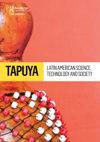学校公民科学的EXPLORA模式:智利南部跨文化的设计与实施
IF 1.2
Q2 HISTORY & PHILOSOPHY OF SCIENCE
Tapuya: Latin American Science, Technology and Society
Pub Date : 2022-11-11
DOI:10.1080/25729861.2022.2117492
引用次数: 1
摘要
公民科学已成为促进科学教育和民主的一种很有前途的方式。然而,这些目标的实现受到了阻碍,因为大多数教育和其他环境中的项目都使用了自上而下的方法(科学家指导整个研究路径)。在这里,我们提出了一个自下而上的学校倡议,在学生、教师和科学家组成的学院中,学生的兴趣被提高,合作项目被开发。解决当地领土身份的项目尤其受到该计划的推动。在这项工作中,我们探讨了:(i)兴趣的多样性,(ii)学习成果,以及(iii)项目的科学质量。在智利南部跨文化的两年实施中,我们与52所学院合作,开展了涵盖各种研究主题的项目,其中一些项目寻求拯救马普切人的传统知识。我们观察到学生的科学和社会情感技能得到了提升,独立的专家小组对项目进行了高质量的评判。这些结果支持了公民科学在促进学习和促进学校和科学机构之间的联系以实现更民主的科学发展方面的可行性。本文章由计算机程序翻译,如有差异,请以英文原文为准。
The EXPLORA model of citizen science at schools: design and implementation in the intercultural south of Chile
ABSTRACT Citizen science has grown as a promising way to promote scientific education and democracy. However, the realization of these goals has been hampered as most programs in educational and other settings have used top-down approaches (where scientists direct the whole research path). Here we present a school bottom-up initiative, where students’ interests are raised and collaborative projects are developed in academies formed by students, teachers and scientists. Projects addressing local territorial identities are especially motivated by the program. In this work, we explored: (i) diversity of interests, (ii) learning outcomes, and (iii) the scientific quality of the projects. In two years of implementation in the intercultural south of Chile, we have worked with 52 academies, in projects covering a variety of research topics, including some that seek to rescue Mapuche’s traditional knowledge. We have observed the promotion of scientific and socioemotional skills in students, and projects have been judged of high quality by independent panels of experts. These results support the feasibility of citizen science to promote learning and to foster links between school and scientific institutions towards a more democratic scientific development.
求助全文
通过发布文献求助,成功后即可免费获取论文全文。
去求助
来源期刊

Tapuya: Latin American Science, Technology and Society
Social Sciences-Social Sciences (all)
CiteScore
1.60
自引率
0.00%
发文量
39
审稿时长
19 weeks
 求助内容:
求助内容: 应助结果提醒方式:
应助结果提醒方式:


